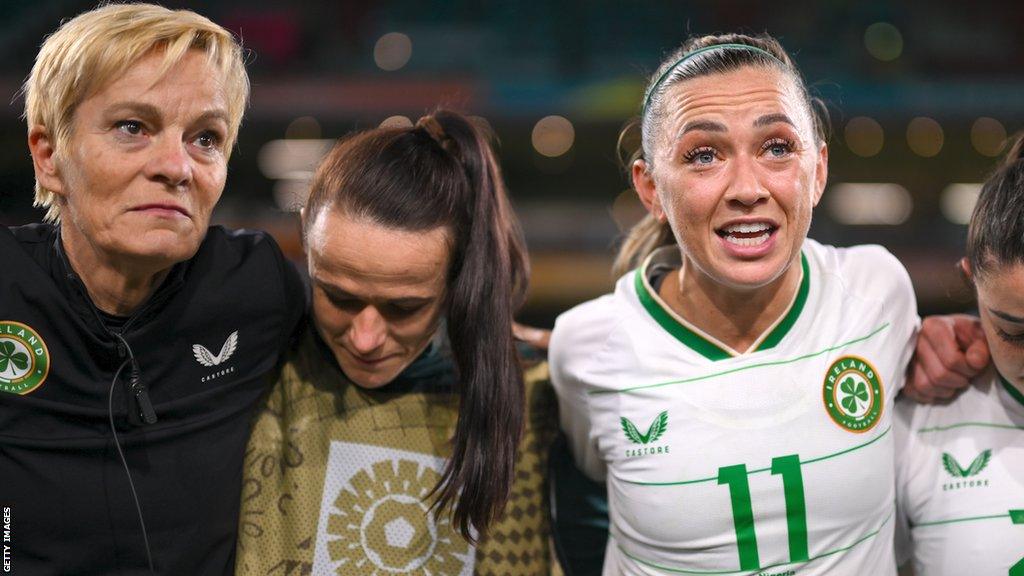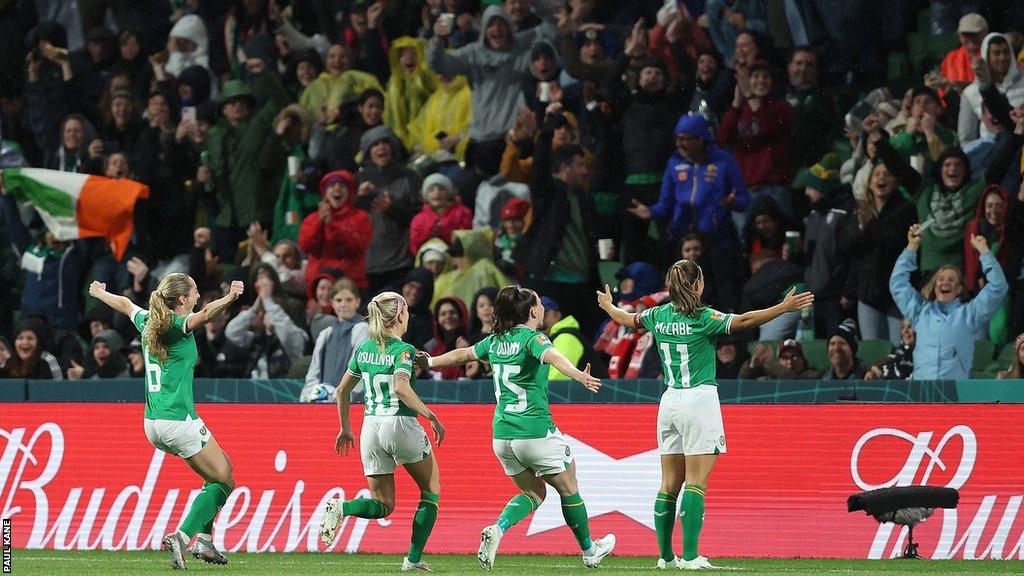Women's World Cup: All eyes on the Republic's future as drama unfolds
- Published

Katie McCabe (right) talks to her team at full-time while Vera Pauw (left) watches on
Sometimes the less said, the louder the noise.
The situation over Vera Pauw's contract dominated the pre-match build-up of the Republic of Ireland's final match at the World Cup with Nigeria.
Despite a historic first point against the Super Falcons, the commotion did not die down. In fact, it grew even louder.
Pauw, whose contract expires after the tournament, has reiterated her desire to stay but that renewal, which looked at one stage like it would be signed and sealed before the World Cup, has yet to arrive.
Now it looks increasingly unlikely it ever will.
There is undoubtedly baggage from the allegations levelled at her in an article by The Athletic on the eve of the tournament.
Pauw has been steadfast in strenuously denying claims of being abusive in previous employment and said she had done nothing wrong. The Football Association of Ireland backed her when the initial allegations came out in December, and said full focus was on the World Cup when fresh claims emerged.
Pauw took a pop at the FAI in Ireland's latest pre-match press conference, saying she and the players deserved clarity over her future and if it was unfair members of the team were being questioned on it.
For what it is worth, players, at various media events before and during the tournament, have not exactly given the 60-year-old a full backing. Again, sometimes what isn't said speaks the loudest.
Then, after the Nigeria game, it was revealed by Pauw that captain Katie McCabe had requested "fresh legs" long before the manager made her first substitution in the 84th minute.
Pauw said she had no problem with that, stating: "A player can say anything to the coach, at least to me." But, what happened next again suggested that all was not well in camp.
A tweet was all it took from McCabe. A zipped face emoji. You can read into that whatever you want.
In the feisty press conference in July where Pauw put in a staunch defence of her own character, McCabe said she had "clashed" with her manager in the past, but it was always professional. This time it has been rather more public.
It's a shame that any disagreements have slipped into the public domain. Ultimately, we are left with more questions than answers.
'What could have been'
How do the Republic of Ireland reflect on the tournament? Ultimately, it's a case of what could have been.
The Irish were drawn in arguably the toughest group of them all, with co-hosts Australia, Olympic champions Canada and Nigeria, who are the top African side and the best fourth seeds.
The opening defeat by Australia, who the Republic had frustrated for the first half, was down to a clumsy tackle in the area. Matildas captain Steph Catley did the rest from the penalty spot.
The second game in Perth against Canada gave more grounds for optimism. McCabe scored her wonder goal from a corner in the fourth minute, and for the majority of the first half Ireland were well on top.
However, the Olympic champions hit back to eliminate the Irish with a game still to play.
The draw with the Nigerians was flat. The African side had all but qualified and, thanks to Australia's stunning win over Canada, were happy to sit back. The Republic could not break them down, and that has been a common feature of this team with their defensive set-up.
Women's World Cup 2023: Nigeria and Republic of Ireland play out goalless draw - highlights
It says a lot about this team, and the progress they have made, that they have been so disappointed by such small margins.
It has been a learning process for everyone involved, and such has been the performances it would be a huge surprise not to see this Republic team qualify for another major tournament, whether that be the Euros in 2025 or the next World Cup.
Unlike neighbours Northern Ireland, who the Republic of Ireland play at the Aviva Stadium in September, a swift decision on Pauw's future - no matter what way it goes - is crucial to keep up the momentum that has been built in this tournament.
Pauw, however, was adamant that she will be in charge.
"I don't feel this is my last game because we are going home from a World Cup," she defiantly said, also addressing her attendance at Thursday's homecoming event in Dublin.
"Why would I not be at the homecoming? I go back with my team. Otherwise I would have stayed here and enjoyed the World Cup."
Republic can build on legacy moments
When the dusts settles on what has happened and on whatever fall-out there is to come, the tournament has provided the Republic of Ireland with those 'legacy' moments that can inspire the next generation and will be remember far beyond any disagreements.
McCabe's corner, and the subsequent eruption of noise and colour in Perth, will be the standout moment from the tournament. It will go down in Irish footballing folklore.
The next generation will be trying to replicate that moment in parks, back gardens, on video games. You name it, they'll try it.
Even in the last match, which undoubtedly lacked tempo compared to the other two games, Courtney Brosnan's wonder save, which drew comparison's to Gordon Banks' iconic effort to keep out Pele, will again be replicated everywhere.
The support in general has been unbelievable. Everywhere you turned in Sydney, Perth and Brisbane, you have been met with a sea of green or the familiar accent.
Another stand-out moment was the chants of "ole, ole, ole", moments before the teams emerged from the tunnel in the opener with Australia.
Striker Kyra Carusa said at the time it was like the noise came down the tunnel and hit her in the face. Up in the press gantry is was also spine-tingling stuff.

The goal. The celebration. The noise. The fans. The weather. Katie McCabe's goal against Canada will go down in history
While the immediate aftermath will be focused on the fallout in Brisbane, there are brighter things on the horizon.
After qualifying for their first major tournament, attention will be on September's Nations League homecoming with Northern Ireland at the Aviva Stadium - no matter who is in the dugout.
The Nations League is swiftly followed by qualifying for Euro 2025 and the marker has already been laid down - the team have to back it up with qualification.
It's a great chance to build momentum and ensure the green jerseys will be running out in Switzerland in the summer after next.
The stand taken by the team in 2017, where they threatened strike action over conditions, was the turning point. Now this World Cup has to lay the foundations for more success and progress.
All eyes are on the future, whatever that may hold for Pauw and this group of players.